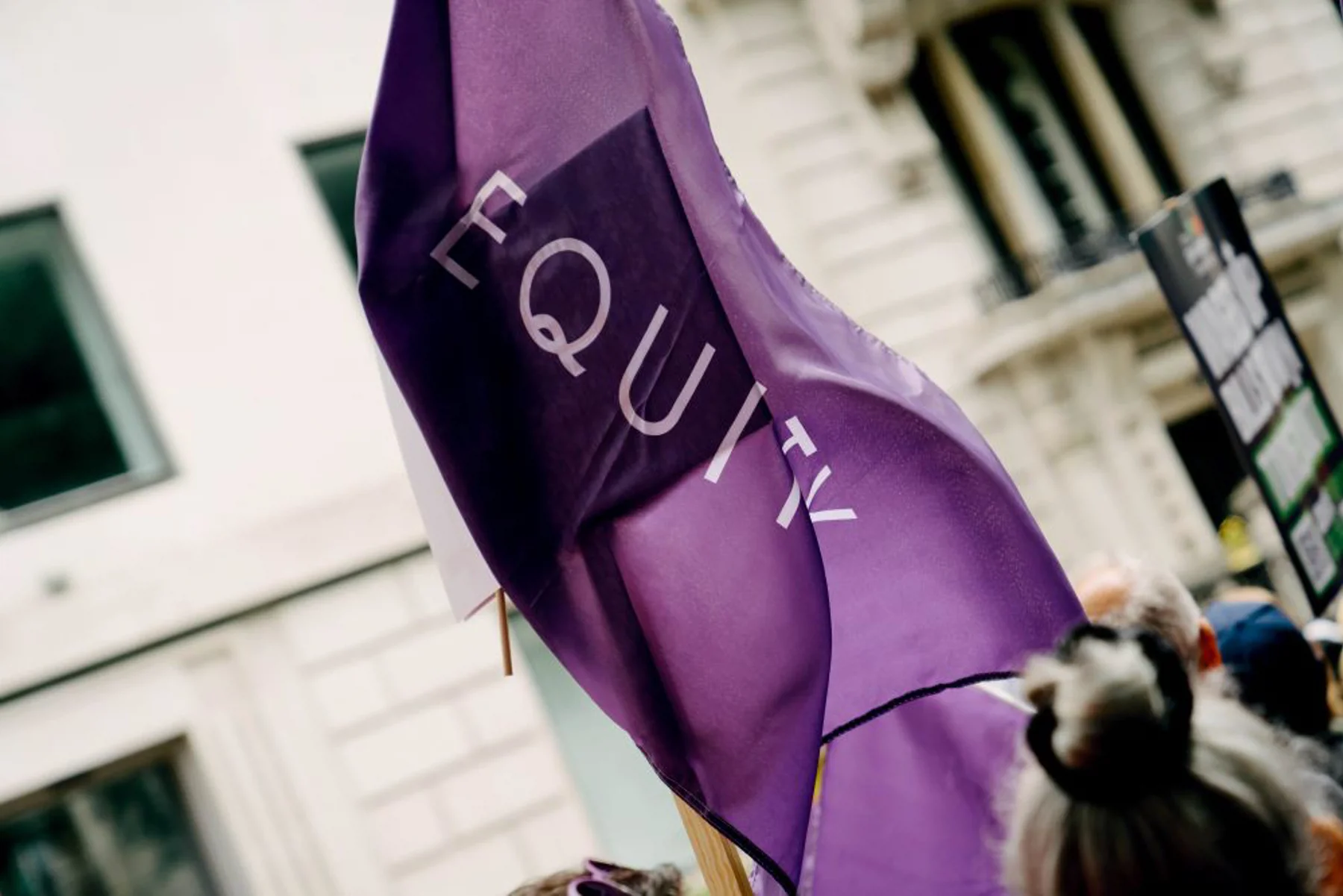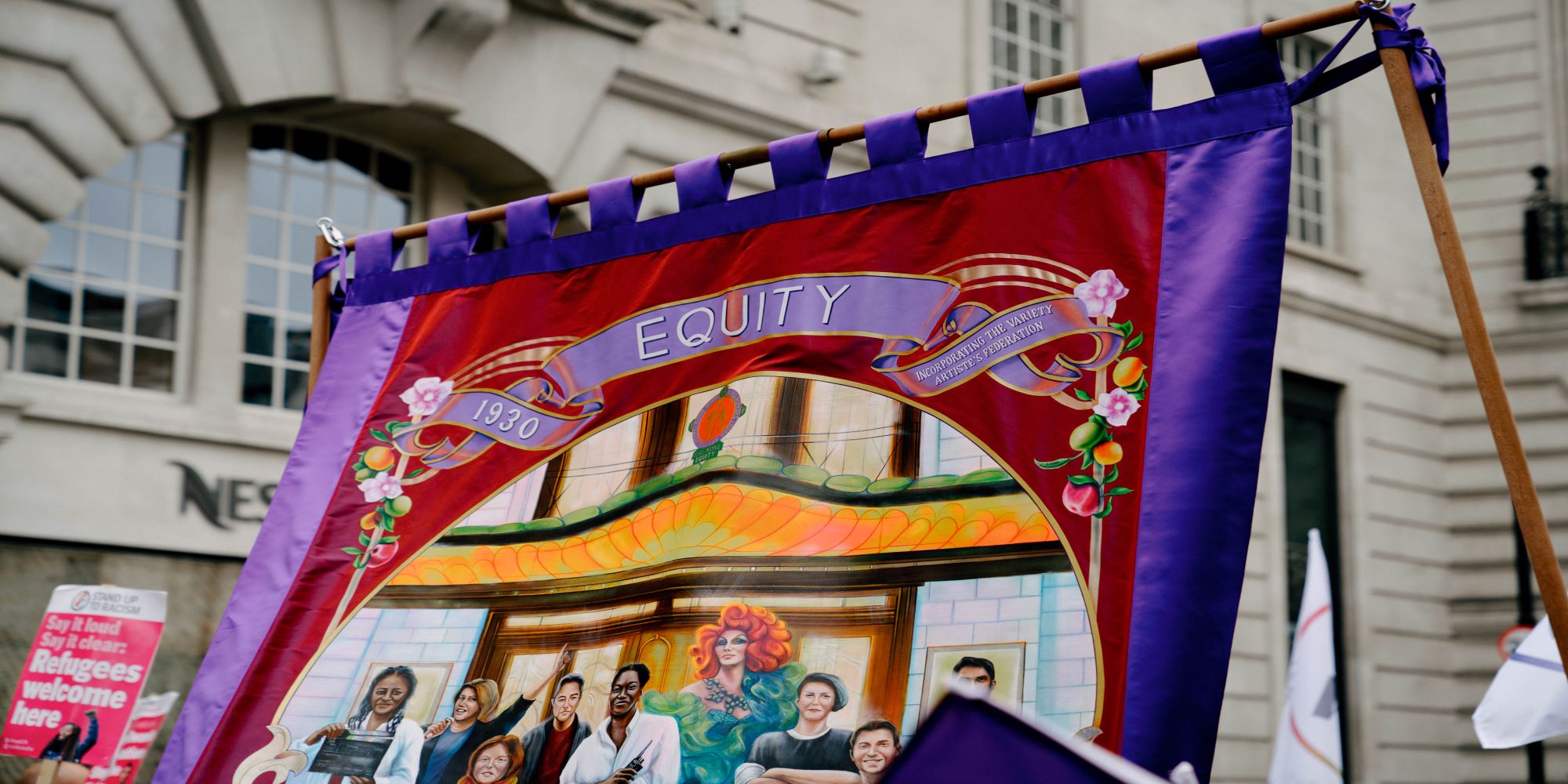This morning (11 July) eight Equity members filed papers at the High Court in a class action against Spotlight.
We are seeking a declaration from a judge that the law and the relevant regulations (outlined below) apply to Spotlight. A successful judgment would mean that the courts agree that Spotlight must show that their rates of subscription to their members amount to no more than a reasonable estimate of the cost of production and distribution of their directory.
Casting directories like Spotlight charge the artists in the directory a fee for inclusion in the book. In most industries this practice – of charging work seekers a fee irrespective of whether they find work – is not legal. However, Spotlight (who argue the law does not apply to them at all) and other directories enjoy a carve-out from the regulations governing employment agencies which is specific to our industries and the professions of Equity members.
Equity has not opposed this carve-out historically, but in the face of mounting member concern about the cost and commercial practices of Spotlight and other directories, union policy is to lobby government and campaign to end this practice. It cannot be right that those who need work bear the cost of recruitment in our industries alone. For actors in particular, the perceived necessity of being included in Spotlight means that their hope for work comes at a cost. This cost is a tax on that hope.
Our conversations with the Labour Party in opposition, and in their early days in government, are constructive in this regard as they seek to bring about a ‘New Deal for Working People’, and improve rights at work.
The current legislation and the carve-out for our industries do not give a blank cheque to casting directories to charge what they please. The relevant regulation explicitly states that:
“the fee charged to the work-seeker [must] amount to no more than a reasonable estimate of the cost of production and circulation of the publication attributable to the inclusion of information about that work-seeker in the publication”
Spotlight is the most widely used casting directory, and Equity is not satisfied that they are meeting the above obligation. In simple terms, we believe Spotlight’s subscriptions charged to its members are above what the law reasonably allows.
We wrote to Spotlight at the end of January this year to ask them to explain the rationale for their fees, and show how they have calculated them in line with the above obligation. Spotlight replied dismissively in February stating that they did not believe that they were an employment agency at all and therefore the law did not apply to them or their business. Equity disagrees.
We have spent the past few months fact-finding and taking further advice on this and other areas of the law. Equity’s position remains unchanged.
We of course remain open to a dialogue with Spotlight, and will work with them on issues of mutual concern for our members. We’ve continued to speak with senior staff at Spotlight throughout this year on matters unrelated to the case, and believe that a spirit of constructive engagement is in Equity members interests.
However, we consider that gate-keepers, like Spotlight, should continue to enjoy an exemption from standard work-finding legislation is unjust and unfair. Moreover, if we cannot be satisfied that Spotlight are keeping within the generous scope of the carve-out, and Spotlight believes that they are beyond the scope of the law, then our members have no recourse except to the courts.
This may be the beginning of a long process, and so we urge patience from members with the courts and the inevitable bureaucracy which comes with class action. However, we are determined to hold Spotlight to account as an industry monopoly who are gate keepers to work, and in the long term end the business model of casting directories – which is a tax on hope - altogether.
See the below FAQs with information about Equity’s policy, legal action, and approach.
Spotlight update FAQs
Spotlight is a casting directory, which matches actors with available jobs. Spotlight claims to have around 90,000 members and 99% of projects in theatre, TV, and film are cast through them.
Equity is a trades union, representing working people as working people. We don’t represent members as consumers or customers of other businesses. However Spotlight isn’t just another business, it is the gateway through which working people access jobs. It is an integral part of how Equity’s members get work. It is in our members’ interests that access to work is fair, and the costs of doing so are borne by the bosses, the producers, who are seeking to hire people.
By definition, those who need money are seeking work and those who have money are seeking to recruit. However Spotlight’s model charges only those seeking work, and only agents or casting directors who are not members of the largest associations for those professions: the PMA and CDG. We believe this is unfair, but we also believe that the rates charged by Spotlight are likely higher than the amount which the law allows them to.
Equity believes that casting directories like Spotlight are covered by the Employment Agencies Act 1973, and the Conduct of Employment Agencies Regulations 2003’. This Act and these Regulations forbid businesses whose purpose is to help people find work from charging the work seeker a fee up front. However, the Regulations exempt certain professions from this rule ‘in respect of the inclusion of information about the work-seeker in a publication’. Most of the professions which are exempted are in the performing arts and entertainment industries, and acting is included.
In short, the law allows casting companies like Spotlight to charge actors a fee to be included in their directory. Equity has started a political lobbying campaign to get the government, as part of Labour’s ‘New Deal for Working People’ to remove this carve-out. We see no reason why our members should be treated any differently from any other work-seeker.
Equity believes that Spotlight is allowed to charge work seekers a fee for inclusion in their directory under the current law. We want this law changed, but what the current Regulations already do not allow is for Spotlight to charge any amount to its members.
The Regulations state that a business charging work seekers in exempted professions (like actors) for inclusion in their directory must ensure that:
“the fee charged to the work-seeker [must] amount to no more than a reasonable estimate of the cost of production and circulation of the publication attributable to the inclusion of information about that work-seeker in the publication”
Equity wrote to Spotlight to ask for an explanation as to how their fees were calculated with reference to this legal requirement. Spotlight replied saying that they did not believe that their business was covered by these Regulations at all as it was not an employment agency as defined by the Act. Equity disagrees.
In July 2024, eight Equity members, plus the union, started a class action at the High Court, seeking a declaration that Spotlight was indeed covered by this Act and the Regulations. Success would mean that Spotlight would have to show that the fee they charge members amounts only to a reasonable estimate of the cost of the production and circulation of their directory.
Spotlight’s claimed membership has grown from 60,000 in 2017 to 90,000 in 2024. Their subscription has increased from £150 to £198 per year. Using Spotlight’s own figures, this means an increase in income from subscriptions of over 180% in seven years. We also think it unreasonable to assume that the costs of running a digital only service remain the same as when Spotlight still produced physical directories — up until 2016.
Equity does not believe that the law allows Spotlight as a business to charge whatever it likes to its members. We believe that Spotlight has to show that their subscription charges amount to no more than a reasonable estimate of the cost and distribution of the directory. It seems unlikely that costs per member have risen by such a significant amount since 2017.
Further, we are aware that sometimes high profile and well-paid artists are given free Spotlight membership, not on request, but at Spotlight’s pro-active discretion. Spotlight’s partnership with German casting directory Filmmakers.de offers access to the directory at a substantially reduced cost. The costs of other platforms in the UK and globally for performers are significantly lower than Spotlight’s fees. All of these factors mean that it is reasonable for Equity to ask Spotlight for evidence that they are only charging a reasonable estimate of the costs of compiling and distributing the directory to the overwhelming majority of members in the UK- and that they are not subsidising the subscriptions of others, let alone generating profit for Spotlight.
Equity’s 2022-4 Council launched a review of our policy on supporting the law allowing casting directories to charge subscribers in 2023. Spotlight’s decision to launch, and then reverse, a ‘Premiere’ tier of membership in November 2023 also impacted the union’s review of the policy.
It became clear that Spotlight has moved to a different business model to the type used when these regulations were last reviewed. Instead of being a family-owned company, intimately connected to the UK industry, they are now owned by an American company called ‘Talent Systems’. They are taking a much more aggressive and commercial approach with their directories, using Spotlight’s monopoly position as a platform to launch expansion elsewhere in Europe.
Equity has never supported a blanket right for casting directories to charge what they please, that’s why Equity historically supported the exemption – because members were protected by the clause which meant Spotlight and other directories could only charge members a reasonable estimate of the cost of the compilation and distribution of the directory.
Equity’s new Council wants to ensure that that the protection which the union believes the law gives to Spotlight members is properly applied, and given due heed as part of any corporate strategy which Talent Systems uses.
No. Equity wants to see Spotlight use the same model as equivalent services in other sectors. This could be by charging employers or all casting directors to use the directory.
Equity will always work with Spotlight in good faith where there are issues of concern for members of both organisations. There are huge advantages to having a constructive working relationship with a single organisation who are an integral part of the casting process.
However, we don’t believe that this should mean that Equity should not challenge Spotlight where we believe they are not meeting their obligations to our members.
Spotlight is a business, and they have every right to make decisions about how they run that business, provided they meet their obligations under the law to our members. Equity doesn’t represent our members as consumers or customers of Spotlight who want ‘good value’, we represent them as working people who want fair access to good quality jobs. The current rates of Spotlight subscription, and the carve-out in the law for our industries, affect Equity members’ ability to access good quality work.
The law is silent about the services which Spotlight should provide, and about their quality. However, Equity believes the law is clear that to access the Spotlight directory, members should only be charged a fee which represents their share of a reasonable estimate of the cost of compiling and distributing the directory. It is that legal protection which can be enforced through action.
It is the role of a trades union to protect its members and advance their rights when it comes to casting practices – or as other sectors call it: recruitment practices.
There are eight members of Equity who are the named claimants. Class action only requires some, not all, Spotlight or Equity members to take a claim. At this point, the action is asking for a declaration from the courts that the law applies to Spotlight in the way that Equity believes.
The claimants were approved by Equity Council. Included are the four lay officers of the union (Lynda Rooke, Jackie Clune, Nick Fletcher, and David John) and two Equity councillors who have led the work on changing our policy on casting directories (Jassa Ahluwalia and Hywel Morgan). Two other women members have joined the claimant group: Tonia Daley-Campbell, Midlands Councillor and Honorary Life Member, and Natalie Amber, Chair of Equity’s Deaf and Disabled Members Committee. We want to emphasise that the charge on members of Spotlight is most prohibitive for those who are least represented on our stages and screens: in particular artists of colour, women, and Disabled artists. Council is proud to ensure that the group is gender balanced and includes representation from all these groups.
Equity’s lawyers wrote to Spotlight in January 2024, and Spotlight responded the following month. We wanted time to properly consider their response, and to take further legal advice on potential avenues of challenge. This process is likely to be lengthy and we wanted our new Council to be briefed on it before it began. This process is slow because it is important that we take a considered approach in a forensic way.
The time required to resolve this issue is henceforth in the hands of Spotlight and the courts. If Spotlight would agree to show how their fees represent a reasonable estimate of the cost of the compilation and distribution of the directory, then the matter could be resolved more quickly. If Equity is successful, then we would hope that Spotlight would work with us to appoint appropriate professionals to assess what costs are reasonable to be borne by members of Spotlight.
Our courts and legal system have suffered over 14 years of austerity and won’t move as swiftly as we might like. Equity will keep members updated at key moments as soon as we can.
Spotlight is by far the largest, most widely used, and the most expensive of the casting directories in the UK. They have made recent commercial decisions, and are claiming significant expansion, which means that Equity is concerned that they are charging our members an unreasonable amount. It is clear that the cost of Spotlight is deeply and widely felt by our members, and that the cost of other platforms is a secondary concern to the quality of the work which is advertised on them.
We think that the current law applies equally to all casting directories, so the clarification that Equity is campaigning for applies to would apply to all directories too. Depending on the outcome and as our understanding of the reasonable cost of the directories develops, Equity does not rule out similar action against other directories in future.
The Regulations which mean that casting directories can only charge a reasonable estimate of the cost of the compilation and distribution of the publication also state that the publisher of the directory must allow subscribers, in advance of subscription, access to the “ current edition of the publication, or where the publication exists only in electronic form, give [them] access to a current edition of the publication”
The reason for this is to allow subscribers the ability to assess whether they are actually being charged a reasonable estimate of the cost of the directory. A directory of 90,000 subscribers versus 65,000 subscribers will have different costs, and a different base to share them among. At the moment, all subscribers have to take Spotlight’s word for how many members they have, which, when we believe that they have a legal duty to be transparent as to how they come to their costs, is clearly not satisfactory.
This legal right also means that those looking to enter the directory, and those who are members of it, can assess the market of employment for themselves.
There are a few reasons why Equity isn’t going to set up a directory ourselves.
The biggest reason is an ethical consideration. Casting directories are a fundamental part of how producers find artists. That means they have to work in a way which the producers need. Equity wants to see a world in which producers are paying for the costs of casting, so if we’re providing a directory, that means your union responding to the commercial interests of procures, as well as having a interest in who gets work. Your union should be independent of the interests of the bosses - and not be part of perpetuating problems created by producers in the casting process.
There are significant legal reasons why Equity can’t effectively do it either. The law we believe binds casting directories means that directories should not charge artists more than the reasonable estimated costs of inclusion in and distribution of a directory. Thus, the directory would have to be separate to your monthly subscription, and open to non-members. Equity subscriptions are lower than Spotlight’s without offering a directory, doing so effectively would mean keeping the costs on the workforce, whether they were working or not, through their union subscriptions.
Moreover, trades union membership is ‘special category data’. That means it’s the most sensitive type, equivalent to a medical record; this is to stop employers discriminating against you because you’re standing with your fellow members against injustice at work. Thus, any directory would have to be opt in. It’s not as simple as automatically putting every member in an accessible directory.
With these limits in mind, Equity tried a casting directory of members which was opt-in for over a decade. Less than 1,000 members opted in, and most of their profiles weren’t regularly updated. Essentially entering into competition with established casting directories would cost significant resource and marketing - that’s not our core function. We’re a union, here to represent people against the bosses and make processes fairer.
If it were successful, we have an even bigger problem. By law, you can offer an incentive to be a union member, but not an ‘inducement’. If Equity’s platform was the primary or only way to get work, we’d run foul of the law. Notwithstanding the fact that would would have to offer membership of the directory as separate to union membership, there are other problems even if we made a success of it.
Our members’ subscriptions mostly pay for support for other people. That standing together means we can pay for insurances, legal support, negotiate agreements, give advice, lobby and campaign. Membership of a casting directory is an individual choice, about your individual interests in the face of recruitment/casting controlled by producers. It’s not a collective endeavour but a personal service - simply put, it’s not what unions are about.
By definition, those offering work have money, and those seeking work do not. That’s why the costs of casting should be borne by bosses, not workers. Producers need actors, and they will always need to shape the platforms by which they find them. In short, designing, delivering, and paying for work seeking tools is primarily a problem for engagers, and not our members - however much the industry has hitherto conditioned us to think the opposite. It is always the union’s role to resist the unimaginative casting practices which have defined the industry, by holding the bosses and their platforms to account.




